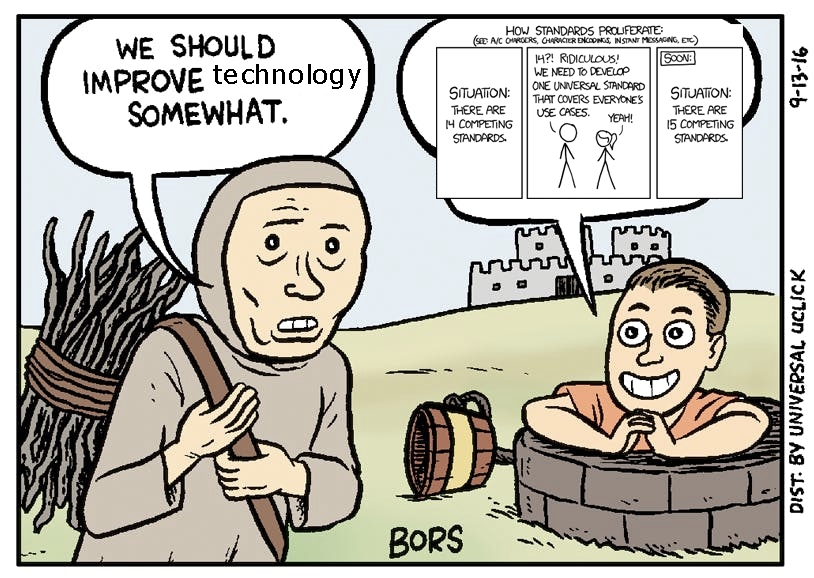MIDI.
Before the 80’s, there was no standard interface to control electronic instruments, just a bunch of proprietary interfaces unique to each manufacterer. But in 1983, amazingly they actually standardized on MIDI, and it remains a useful standard to this day, with any new versions of MIDI being completely backwards compatible, so your Yamaha DX7 from the 80’s is still just as viable to use today as the day it was new!
If there are fourteen of them, do they deserve to be called “standards” at all?
Light bulb sockets are the same all over. RJ-45 Ethernet, USB-C, Bluetooth, WiFi, TCP, HTTP, HTML, CSS.
Include car cigarette lighter power ports
USB-C
Gonna have to disagree with you there. Try using a USB-C data cable to charge a device. Now try figuring out which cable out of five is the charge cable.
Those aren’t different standards, they’re just different USB-C cables. It’s like saying light bulb sockets aren’t a unifying standard because there’s different bulbs with different wattages. The fact that all those cables work over the same standard is an example of how ubiquitous the standard is. That said they should be labeled better, like how USB3 was color coded blue; each cable could have a color strip to distinguish it.
It seems a lot of sites these days are actively hostile towards the HTML-CSS combo.

There are many, I think. Like what other people have mentioned, sometimes the new standard is just better on all metrics.
Another common example is when someone creates something as a passion project, rather than expecting it to get used widely. It’s especially frustrating for me when I see people denigrate projects like those, criticizing it for a lack of practicality…
The competing standards problem is mostly a problem of not actually talking to stakeholders. Most of these “universal standards” don’t cover some rare, specific, but very important, use cases.
I was surprised to find that there are a ton of symbols that have sought to become the standard notation of sarcasm in text. I think we should really adopt one of those that are far more elegant than the “/s.” /s Looks ugly as fuck.
look at a physical keyboard and show me any of those symbols.
i like /s
I’m going to assume that is sarcastic.
no (yes), i prefer no sarcasm marker ideally, but if you have to, i prefer /s over some others (i dont like /jk or lol). If you can’t tell sarcasm from not sarcasm, you really should not be using internet.
for those who did not get it, this statement was sarcastic and written without /s
But your comment has /s? We should define some escape prevention characters to prevent confusion when using /s /s
Poe’s law friend. There are people who honestly believe the earth is flat. There is an elected government official who has made public claims about Jewish Space Lasers.
We live in the dumbest timeline, no matter how stupid or insane a comment is there is someone who legitimately believes it.
Whenever the new standard hits the almost impossible golden triangle of “cheap, reliable, and fast”.
It’s gotta be cheaper than the alternatives, better and more reliable than the alternatives, and faster/easier to adopt than the alternatives.
Early computers for example had various ways to chug math, such as mechanical setups, relays, vacuum tube’s, etc.
When Bell invented their MOSFET transistor and figured out how to scale production, all those previous methods became obsolete for computers because transistors were now cheaper, more reliable, and faster to adopt than their predecessors.
Tbf though transistors are more of a hardware thing. A better example of a standard would be RIP being superceded by BGP on the internet.
Tbf though transistors are more of a hardware thing. A better example of a standard would be RIP being superceded by BGP on the internet.
another big example is the telecom companies being superseded by IP based networking, rather than whatever patch routing bullshit was previously cooked up.
Sometimes certain solutions are just, better.
UEFI boot mode
Anything by Sony
Small net protocols like Gemini, gopher, spartan, IPFS because they don’t compete with the web instead they coexist as separate things.
There are a lot and in most cases you’ll notice when dealing with Americans, who are refusing to do stuff like the rest of the world. The meter and kilogram took over from hundreds of different measurement standards. Most of the world is using the same calendar and writes dates in the same way. Most countries are driving on the same side. Traffic signs are kind of the same worldwide. You can buy screws with the same standard everywhere.
what if instead of coming up with new standards to the pile you combine existing ones, based on what works and is reasonable to do?
…that would create a new standard.
yes, but the point is to make something that might actually become new standard instead of making the problem worse. I think the problem is that everyone wants to make something that is great for them and hopes others will just willingly or unwillingly use it.
I think it’s pretty rare that people aren’t trying to make a thing they think is better than what already exists. Even in the comic, they think they’re solving the problem, just like you.
Yes they are, but if result is not improvement then there is a problem in the process. I think that problem is that people just dont think beyond themselves enough.
Who said there weren’t improvements?
Even in your example of combining two, there’s going to be tradeoffs depending on what pieces they choose from each. Sometimes there isn’t an objectively better thing in all aspects.
the ultimate goal of everything should be to try making things better, otherwise what is the point. That is the baseline of all my thinking.
As is the mindset of everyone who set out to make a better standard. You don’t seem to be getting that.
Not exactly this, but it reminds me of my first job. I used to work in finance, and I was given the task of automating cash flow reports that were sent out to hundreds of clients.
The problem was that they were made manually in Excel, and most of them were unique. So every couple years they’d get a bunch of smart people in a conference room, and tell them to figure out how to automate the cash flows. The first step was always to create a standard cash flow template, and convince everyone to adopt it.
Some users would adopt the new template, but most of them would say that the client didn’t like it, so they’d stop using it and the project would fall apart.
By the time I got there, there were still hundreds of unique cash flows, but then there were a few dozen that shared the same handful of templates, like a graveyard of failed attempts to automate this process.
I just made the output customizable. The reports looked the same as what the client was used to, but it saved hundreds of man hours for the users. A lot of people got laid off.
emacs is everything
Except fast.
Eight Megabytes And Constantly Swapping
Fortunately I have added a few dozen gigabytes of RAM since that aphorism was popular, and today emacs barely ever swaps very much when I don’t deserve it
It just needs a good text editor, is all.
USB has worked pretty well IMO
USB , mini USB, type C USB, iphone bs, do those not count?
USB-C is the latest standard. Try buying a phone, mouse or headphones swith mini USB these days.
Not compared to what we had before usb
It used to be 100% proprietary for everything
Yeah just don’t pay too close attention to the unofficial power delivery protocols.
or the cursed double ended USB-A cables
“looks inside” meme with the “oh. oh no” meme spliced onto the end
My main complaint about USB is the cables. There’s no way of knowing what standards and data speeds the cable may support.
They’ve now, at least, released a standard set of markings. Basically, the data speed in Gb and the power capacity in Watts will be printed on the connector. Whether chinese suppliers will bother complying is another matter.
Your typo makes your comment really confusing because it means the opposite of what you meant to write.
Edited to fix. 👍
The way I see it, it’s not so much an issue of making something that’s better than the other standards. It’s really about getting your standard into actual use and hitting critical mass which makes all the other standards irrelevant.
Yeah. No standard covers all use cases. It’s just best to have one standard that makes a lot of compromises.
see also: NACS (yep that’s a Tesla plug in a standards agreement)












